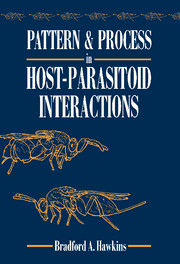7 - Synthesis
Published online by Cambridge University Press: 04 May 2010
Summary
The major goal of this work has been to determine if it is possible, through the haze of imperfect data and a mass of ecological and evolutionary complexity, to identify general patterns in host–parasitoid interactions. My approach is in stark contrast to that of others who have rightly pointed out the complex and idiosyncratic nature of relationships involving a majority of the described species on the planet (see for example, Price, 1994). Undoubtedly, the weakness of some of the patterns found does reflect the fact that ecological communities are complex, and that much more focused studies are required for discerning underlying relationships in particular host–parasitoid groups. On the other hand, it does not follow that the forces structuring communities are so varied and convoluted that attempts to derive general principles are hopeless. Reasonably clear and consistent relationships between a herbivore's feeding niche and the size and composition of its parasitoid complex, the maximum parasitism rate it suffers, the probability that parasitoids will severely depress its density, and even the species richness of its hyperparasitoids, identify factors related to host feeding biology as being of fundamental importance to the interactions between parasitoids and their hosts. If the patterns found in my data are as robust as they appear, I believe that feeding niche can be used as a template on which to build a general theory of host–parasitoid interactions.
Information
- Type
- Chapter
- Information
- Pattern and Process in Host-Parasitoid Interactions , pp. 151 - 168Publisher: Cambridge University PressPrint publication year: 1994
